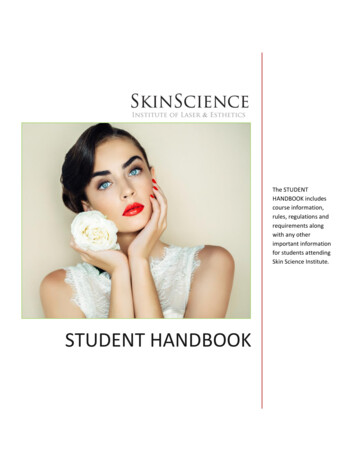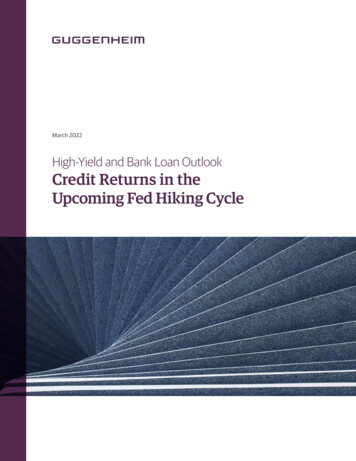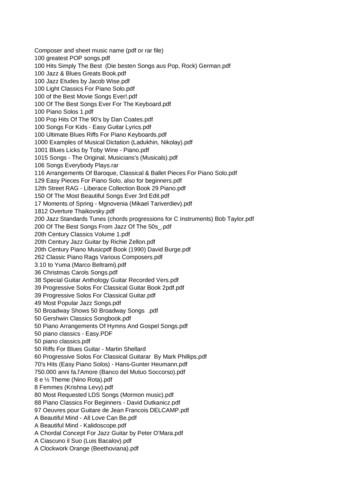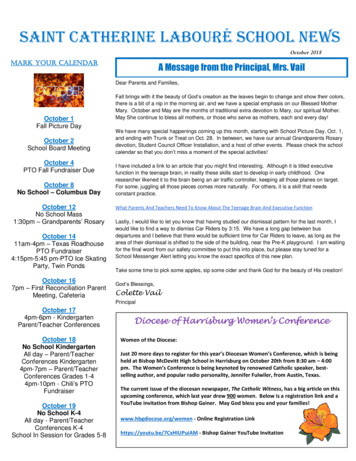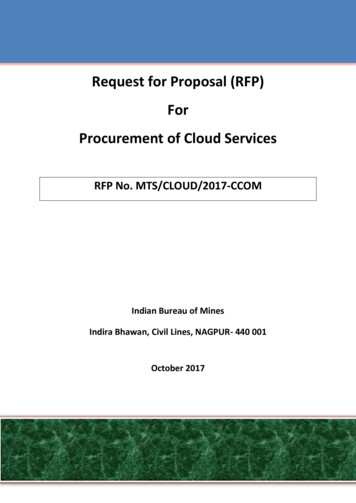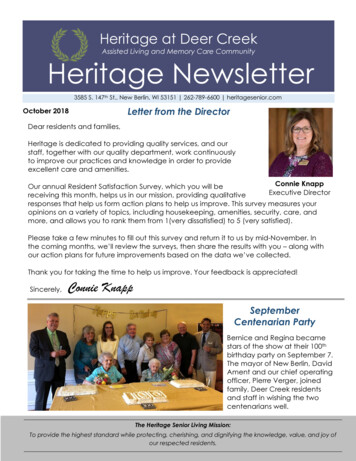
Transcription
OCTOBER—DECEMBER 2020 VOL. 23. NO. 4https://stewardship.adventist.org/
INSIDE DYNAMIC STEWARD3 STEWARDSHIP MINISTRIESSTRATEGIC ORIENTATION 2020-202517 INTERNAL CONTROLS5 A PATHWAY TO TRANSFORM REALITYUnderstanding the Strategic Orientation DocumentFUNDAMENTAL PRINCIPLES FOR19 ACHIEVING FINANCIAL WELL-BEINGWHAT IS VITALIZED SPIRITUALITY?21 WHEN GOD WHISTLES, I WILL GO!711 MAKING "I WILL GO" POSSIBLEQuestions and Answers About the Combined Offering PlanThe Journey of a Note23 NEWSPROMOTING ORGANIZATIONAL15 STEWARDSHIPThe Attitudes and Actions of the Leader5I WIL L G OSeveral individuals in the Bible and throughout AdventistChurch history have made “I Will Go” their life's motto.As we start a new quinquennium and get ready to share ourresponse to the GC “I Will Go” 2020-2025 Strategic Plan, oneBible character especially comes to mind: David the giant killer.On the battlefield of Sokoh in Judah, the challenge wasclose, persistent, beyond normal, and required someone toconfront it. David’s brothers, the soldiers, King Saul, and everyone else involved commented on the gigantic challenge. Theyknew about the appropriate response and the reward awaiting the individual who would accept the challenge. Knowledgewas not the issue, faith and courage were. But no one daredto take the challenge, except the little lad from Bethlehem:“Let no one lose heart on account of this Philistine; your servantwill go and fight him” (1 Sam. 17:32, NIV).Various characteristics forged David into the hero of thiscrisis. In my estimation, one of these deserves our special attention as related to stewardship ministries: David acknowledges thesufficiency and efficiency of his resources to face the challenge!2October - December 20201115Today, God’s people confront another daunting challenge:accomplishing God’s final mission. Mission in the end time is achallenge close to us, persistent, beyond normal, and requiringa man or a woman who will take God at His word. Who willtake a stand?Our response in stewardship ministries is to lead God’speople to acknowledge the sufficiency and efficiency of theirresources to accomplish God’s final mission. This is bestfulfilled by spiritual nurture, stewardship education, and thefostering of a trustworthy church context. I invite you tointeract with our strategic orientation document and enjoythe following articles that emphasize some of the document’skey elements.We Will Go!—Aniel Barbe, Editorh t t p s : / / s t e w a r d s h i p. a d v e n t i s t . o r g /
OUR R ES P O NS E TO I WI LL 25“In the last extremity, before this work shall close, thousands will be cheerfully laid upon the altar.Men and women will feel it a blessed privilege to share in the work of preparing souls to stand inthe great day of God, and they will give hundreds as readily as dollars are given now.”—Ellen G. White, Counsels on Stewardship, p. 40VISIONPeople putting God first (Gal. 2:20).MISSIONInviting members to trust God as Owner and Provider,and to partner in His final mission through regular and systematic giving.Dynamic StewardPROPOSED GOALEach year, an additional 2 percent of the membership, atthe start of the year, is participating in tithing and regular giving.LEAD MEASURESArea 1: Spiritual EmpowermentMembers are nurtured spiritually, with a focuson the God-first principle, through home visitations, weekly offertory devotionals, regular stewardship sermons, annual commitment ceremonies,and other relevant activities.Area 2: EducationAll segments of the church membership,including prospective members, should receiveadequate training in regular and systematic giving,in their responsibility of supporting the local andworldwide mission equitably, in management ofpersonal finances; and other relevant topics basedon the Bible, Ellen G. White’s book Counsels onStewardship, and her other writings.Area 3: Accountability and TransparencyStewardship leaders encourage and worktogether with the leadership of the church toestablish an internal control system, comply withthe Use of Tithe guidelines, assist in ensuring thatregular financial information is provided to allmembers, and engage in other actions that con-October - December 20203
postings. Prepare and share the Annual Stewardship Emphasis Week material. Share other GC-sponsored productions.DEPARTMENTAL FOCUSRecognizing that all ministries of thechurch are already nurturing people toembrace stewardship principles at-large;the Stewardship Ministries Department’smandate is to focus, but not exclusively,on inviting members to trust God asOwner and Provider, and to partner inHis final mission through regular andsystematic giving.tribute to building trust.MONITORING AND EVALUATIONLocal church stewardship leader/treasurer should reportabout the achievement of the goal to the church board atleast once every quarter.All administrative units should repor t about theachievement of the goal to the next higher organizationat least once a year.All local churches and the local conferences should reporton the execution of the lead measures tothe next higher organization at least oncea year.Account, Review and Plan (ARP)meetings should be held at least oncea year and involve stewardship leadersand their counterparts at the next higherorganization to discuss the achievementof the goal and the execution of leadmeasures.SUPPORT FROM GC STEWARDSHIP MINISTRIES Prepare and share the weekly offertory devotionals (readings and videos). Prepare and share the Stewardshipmonthly God-First newsletter. Prepare and share the quarterly Dynamic Steward magazine. Develop and share a stewardship curriculum for use by Adventist collegesfor theology majors. Prepare and share the social media4October - December 2020RECOMMENDED OFFERING PLANFollowing the recommendation ofthe 2002 GC Spring Council vote, theGC Stewardship Ministries Departmentwill encourage the adoption and ap3plication of the Combined Offering Planby the divisions, explaining the plan andshowing its advantages.“The home missionary work will be farther advanced in everyway when a more liberal, self-denying, self-sacrificing spirit ismanifested for the prosperity of foreign missions; for the prosperity of the homework depends largely, under God, upon the reflexinfluence of the evangelical work done in countries afar off. It isin working actively to supply the necessities of the cause of Godthat we bring our souls in touch with the Source of all power.”—Ellen G. White, Testimonies for the Church, vol 6, p. 274h t t p s : / / s t e w a r d s h i p. a d v e n t i s t . o r g /
Credit: Getty ImagesRE S P O NS E TO I WI LL GOAPATHWAY TOTRANSFORMREALITYUnder s t a ndi ng t heSt rat eg i c O r i enta t i on D ocum entANIEL B ARBESeveral days ago, we completed the 2020 StewardshipAdvisory. It is now part of history, and I do believe thatwe have a valuable instrument to make history withour strategic orientation document. During those two days,our main focus was to plan our future actions in the contextof the “I Will Go” GC Strategic Plan 2020-2025.I have to admit that over the years, I have become lesspassionate about the process of planning. The reason is verysimple; too often we are planning with little or no implementation. You know what I’m talking about. Interestingly, theDynamic Stewardconstruction of thiscurrent plan was anexciting experience forme. We had some intensesessions during the past twomonths, and the hours spent inthe advisory were a blessing. However, one disturbing question remains: whatwill be the fate of this strategic document?After listening to Gary Krause, the world AdventistMission director, reminding us about the relationshipbetween God’s final mission and regular and systematic giving,my conviction that the Stewardship Ministries Departmenthas a pertinent role to play was refreshed and revitalized. Wehave the solemn responsibility to succeed in the implementation phase! As a postlude to our advisory, I would like toreinforce the assurance that we indeed have a great plan toaddress today’s challenges. Our plan’s strength is due to twomajor factors: it is part of something bigger, and it rests uponthe four colonnades of effective implementation.We don’t needBeing part of somethingbigger does make a differmore plans forence! Think of a room, say abedroom, that is comfortable,our already fullwell furnished, and stylishlydesigned. Think now of thedrawers, but rather same bedroom as part of amansion or a castle! It’s notroadmaps tothe same thing. Being part ofsomething bigger does maketransform reality.a difference. The stewardshiporientation document is nota stand-alone plan. It is one piece, an important one, but itwas developed as a response to the “I Will Go” global churchstrategic document. We should never lose sight of this connection. There is no place for isolation and competition. Onthe contrary, it calls for interaction and partnership.For us to appreciate the strong link with “I Will Go,” let meshare with you two key performance indicators of “I Will Go”:KPI 6.5 of “I WILL GO”All members and yet-to-be-baptized young people embraceOctober - December 20205
and practice stewardship principles regarding time, spiritual gifts,and tithe and offerings.KPI 9.6 of “I WILL GO”GC Stewardship Ministries, in consultation with division counterparts, develops and implements a well-definedstrategy for achieving increases in tithe and offerings in eachorganizational unit that reflect changes in membership andinflation.Based on this mandate, our strategic document is designedas a roadmap to the mobilization of all church members toboth support and do mission. “As I go, I will use my God-givenresources to drive mission forward.” This is the heart of our plan.Let’s now talk about the four colonnades of effectiveimplementation, which are based on the framework recommended in the book The 4 Disciplines of Execution: AchievingYour Wildly Important Goals.* They are deliberately embeddedin the stewardship orientation document.The first colonnade: Focus on the wildly importantAfter hours of brainstorming, we decided to prioritizethe many good goals and to concentrate on one ortwo goals. Our assumption was that it is not possiblefor an organization, a department, or even for a goodleader, at a given time, to chase after several majorgoals without losing effectiveness. This conviction isclearly reflected in our proposed goal: “Each year anadditional 2% of the membership at the start of the year isparticipating in tithing and regular giving.” Stewardship is rightlymy all in response to God’s all, but it is not possible for onesingle department to focus on all. For this reason, we havechosen to concentrate on raising the level of participation inregular and systematic giving.The second colonnade: Act on lead measuresLead measures are those actions that will make adecisive impact on the achievement of our cruciallyimportant goal. They are both influential and predictive actions. What do I mean? Lead measures can beaffected, either positively or negatively, and once theyare in place we can expect desired outcomes. Ourplan does not only tell people about the inspiringgoal but also provides a clear pathway toward the goal. This isthe function of the lead measures.Our orientation document organizes itself around thesethree lead measures:—Empower members spiritually.—Provide stewardship education for all.—Facilitate accountability and transparency.The third colonnade: Make provision for a compellingscoreboardHere, the focus is on measuring the progress of boththe goal and the lead measures. People who knowtheir score perform differently. It is inspiring andimportant to hear stories and testimonies of faithful-6October - December 2020ness, but a full picture of reality remains a necessity. Over thepast years, a clear scoreboard has become the missingcomponent within stewardship ministries. Stewardshipeducators and other church leaders need to know if they arewinning or losing! This explains the focus of our plan onrevitalizing reporting at all levels. We make regular mention of“Report about the achievement of the goal,” and “Reportabout the achievement of the lead measures.”The fourth colonnade: Create a pattern of accountabilityMake people accountable, answerable for theircommitments and actions. This is the missing elementof many organizational plans. Accountability in ourplan implies that each key person in his or her ownteam makes a commitment about the actions that heor she will accomplish to support the lead measuresduring a given period (month, quarter, or year), andlater reports on what was accomplished in regard to thatcommitment. Our plan makes provision for the pattern ofaccountability through the Account, Review, and Plan meetingsat all levels. It is not rare that our extreme courtesy andreluctance to embarrass others is reducng accountabilitywithin our church organization. For the sake of effectiveness,accountability needs to be restored.You are already thinkingof your own plan andBeing part ofadvisory. Many have alreadyset dates. Some will replicate,something biggerothers will adapt or simplybuild their own plan. Youdoes make aknow what is best for yourterritory. Nonetheless, letdifference!us make sure that we don’thave more plans for ouralready full drawers, but rather roadmaps to transform reality.Keep a tight connection between your plan and the “I WillGo” strategic plan. We are part of something bigger. Remember to establish your plan on the four colonnades of effectiveimplementation.I’ll borrow these words of David, the little lad from Bethlehem, to conclude: “You come against me with sword and spearand javelin, but I come against you in the name of the Lord Almighty, the God of the armies of Israel” (1 Sam. 17:45). The challenge of inviting members to trust God as Owner and Provider, and to partner in His final mission is a gigantic endeavorfor such a time. Let us move forward with holy boldness totransform reality.Pastor Aniel Barbe is an associate director of StewardshipMinistries and editor of Dynamic Steward at the GeneralConference of Seventh-day Adventists, Silver Spring, Maryland.* McChesney, Chris., Covey, Sean. Huling, Jim, The 4 Disciplines of Execution:Achieving Your Wildly Important Goals (New York: Free Press, 2012).** The video presentation for "A Pathway to Transform Reality" can beretrieved at https://www.youtube.com/watch?v Gj4D52fWnrI&feature youtu.be.h t t p s : / / s t e w a r d s h i p. a d v e n t i s t . o r g /
LITY?GROWI NG S P I R I T UALI T YCredit: Getty ImagesAIWHATRIPSISEDUTV I TA LI ZDAN AUGSBURGERGrowing up, I heard about an ancestral family member accepting the Sabbath and becoming one ofthe early Seventh-day Adventists in Europe. I neverheard of any struggle over the Sabbath, but I did learn abouthis struggle with tithing. He was a farmer, and there were fewfunds left at the end of the month, let alone 10 percent to paytithe. The other farmers resisted, convinced that adopting sucha practice would bring financial disaster. He responded to thepromptings of the Holy Spirit, however, joined the church,began paying his tithe, and saw the windows of heaven openwide for him. Where previously he had been able to cut thegrass in the fields used to feed his cows twice, with God’sblessings he was able to cut the same fields three times. Thisenabled him to not only pay his tithe, but also to increasethe size of his herd. As a result, he became one of the mostsuccessful farmers in the region. His story always encouragedme. But part of the story was sobering: he became less faithfulin paying tithe as he became more prosperous, and eventually the miracle of God diminished to where he was able tocut his fields only twice each summer instead of three times.Fortunately, he recognized his error and became faithful again,but the initial heaven-sent blessings never returned in quitethe same way.Dynamic StewardI share this story to highlight the dynamic nature ofstewardship, seen in God’s willingness and ability to bring thepromised blessings of Malachi 3:10 to His children in responseto their faithfulness—if it is for their good and His glory. It alsoreminds us that blessings can be withdrawn. Finally, it exemplifies the all-too-common tendency for giving to drop off asfinancial resources accumulate. Ellen White states, “If richesincrease, men, even those professing godliness, set their heartsupon them; and the more they have, the less they give to thetreasury of the Lord. Thus riches make men selfish, and hoarding feeds covetousness; and these evils strengthen by activeexercise.”1In this article, the first of a series of articles on spirituality and liberality, I will define spirituality in practical terms,consider what constitutes vitalized2 spirituality, provide briefthoughts on the relationship between vitalized spirituality andliberality, and make suggestions on helping members grow inspirituality and liberality.My extensive research on the topic of practical spiritualityled me to prepare for this article by focusing on spirituality and liberality in the Bible and the writings of Ellen White,especially where the themes overlap. My studies confirm thatspirituality plays a foundational role in promoting liberality.What I did not realize was the great degree to which liberalityplays an underappreciated role in fostering spirituality. PutOctober - December 20207
another way, spirituality promotes liberality; ongoing liberality maintains spirituality. Without ongoing liberality, spiritualitydeclines and lethargy often sets in.What Is Spirituality?In the early centuries, spirituality referred to the spiritualexperience of Christian believers, with particular referenceto the presence and activity of the Spirit.3 Over the centuries,however, the meaning of the word broadened to includemystical forms of spirituality, and later, secular forms.4 Threeprimary forms of spirituality are recognized today: biblicalspirituality (the form Ellen White wrote about), mystical spirituality (which is highly subjective and looks to discover God inthe interior depths of the self)5; and secular spirituality (a spirituality that is nonbiblical and based on nature and culture).6Because the word “spirituality” is used for all three categories, some Seventh-day Adventists avoid using it. In EllenWhite’s writings, however, the word “spirituality” is an instructive, frequently used word—we find about 1,500 hits for itwhen searching the E. G. White writings database (includingduplicates)—and accordingly warrants our attention.From the divine side, biblical spirituality refers to theBible-based religious experience of the believer, with particular reference to the animating presence and activity ofGod in the person’s life through the instrumentality of theHoly Spirit—hence spirituality. References to the Holy Spirit’spresence and activity are found throughout the Scriptures,though sometimes in veiled language, particularly in the OldTestament. In the New Testament, Christ spoke of the workand presence of the Holy Spirit in no uncertain terms. Paulalso made numerous references to the Spirit-directed andempowered life.7From the human side, biblical spirituality refers to themany factors that affect the believer’s desire and ability tohave a relationship with God, including but not limited toknowledge—study of the Bible, Spirit of Prophecy, and othersources of information; devotions—prayer, devotional readingof the Bible, and communion with God; relationships—pastand present relationships; sensory information—our sensesare constantly bombarded with information that affects ourspiritual perceptions and ability to have a relationship withGod; environmental—the things going on around us deeplyimpact our spiritual inclinations; desires—both positive andnegative; distractions—cares of life and other time- andemotion-consuming factors; liberality—little recognized, but astrong factor just the same; and physical health—diet, amountof sleep, etc.What Is Vitalized Spirituality?Ellen White used additional words such as “vitalized” and“vivify” in connection with the word “spirituality.” Defined as“to give life” in Webster’s 1828 American Dictionary of theEnglish Language, the word “vitalize” suggests an external lifeand experience-changing power that enlivens one’s spiritualcondition, akin to the life that is enabled as a result of the sapflowing from the vine into the branch. Including some dupli-8October - December 2020cates, “vitalized” appears more than 200 times in Ellen White’swritings. The same dictionary defines “vivify” as “to endue withlife; to animate; to make to be living.” Among the factors thatvitalize one’s relationship with God, we especially find thework of the Holy Spirit—believers are animated and vitalizedby the Holy Spirit but also the study of the Scriptures, communion with God, the knowledge of last-day truth, the graceof Christ, heavenly principles, Christ’s divine nature, divinepower, and blessings derived in the course of witnessing.The Spirit-empowered and infused vitalized experiencecan be strengthened or weakened. When looking at the word“spirituality” in the writings of Ellen White, you will noticethat she is frequently admonishing for or against behaviorsthat impact spirituality. There is, accordingly, a continuum ofmeaning that goes from vitalized spirituality on the positiveside, to backslidden and even spiritually dead on the otherside. Notice the verbs used in the following partial lists: on apositive note, she speaks of factors that “advance,” “cultivate,”“elevate,” “grow,” “increase,” “maintain,” and “preserve” spirituality. On a negative note,she speaks of factors thatProportionality and “curse,” “deaden,” “destroy,”“dwarf,” “hinder,” “injure,”quality cannot be“kill,” “lose,” “rob,” “ruin,” “sap,”and “weaken” spirituality.separated, just likeHer thinking in this regard isconsistent with other writerslove and generosity. of her era, such as J. C. Rylein his highly regarded volumeHoliness, George Müller in his Narratives, and Hudson Taylor inreferring to the work of God in China. What is less obvious isthe impact these vitalizing factors have on overall spirituality.We tend to focus on the more significant factors—surrender,justification, sanctification, etc. —but it becomes apparent instudying our topic that the lesser factors—liberality, readinghabits, health, etc. —play a significant, though less recognized,role.Validation of biblically sound spirituality comes as it isevaluated on the basis of the Scriptures and other divinelyinspired sources of information: God’s leading in the past, coherence with last-day truth, the practical fruit, Holy Spirit-givenimpressions, and reason.Because authentic spirituality is progressive and complementary, biblical spirituality necessarily looks at the past withan awareness that truth is provided on a progressive basisand therefore can result in “present truth” for one era beingmore complete than the “present truth” of an earlier era. It iscomplementary because though truth is progressive, it buildson prior truth.What About Vitalized Spirituality and Liberality?In looking briefly at the interplay of covetousness andliberality, the first great fact is God’s promise of blessings ifwe are faithful in our giving: Malachi 3:10 (NKJV) says, “‘Bringall the tithes into the storehouse, that there may be food inMy house, and try Me now in this,’ says the LORD of hosts, ‘if Ih t t p s : / / s t e w a r d s h i p. a d v e n t i s t . o r g /
Credit: Getty Imagesliberality. The wise man said,“There is that scattereth, andyet increaseth; and there is thatwithholdeth more than is meet, but ittendeth to poverty. The liberal soul shallbe made fat: and he that watereth shall bewatered also himself” (Prov. 11:24, 25, KJV). Ellen White made the following comment in this regard: “Constant, self-denying benevolence is God’s remedyfor the cankering sins of selfishness and covetousness. God hasarranged systematic benevolence to sustain His cause and relievethe necessities of the suffering and needy. He has ordained thatgiving should become a habit, that it may counteract the dangerous and deceitful sin of covetousness. Continual giving starvescovetousness to death.”10I trust you see how thelove of money easily turnsHe has ordainedinto covetousness, which inturn decimates spirituality. Ithat giving shouldhope you also noticed God’splan to overcome covetousbecome a habit,ness: liberality! And howliberality starves covetousthat it may counness. Now notice a storythat shows how God blessesteract the dangerwhen previous failure isoverturned with liberality.will notopen foryou the windowsof heaven and pour out foryou such blessing that there will not be roomenough to receive it.'" This is a fact, and my family member inthe 1800s and countless others have discovered God’s faithfulness when they have faithfully returned God’s portion.The second great fact is the danger of loving money! In1 Timothy 6:10, Paul declared that the “love of money is theroot of all evil.” He went on to say that it is an evil that is bothcoveted and that brings piercing sorrows. In Luke 12:15, Jesus,warning against the danger of covetousness and the vulnerability to deeming material goods as life’s great purpose,stated, “Take heed and beware of covetousness, for one’s life doesnot consist in the abundance of the things he possesses.” Jesusillustrated His concern by relating the story of the rich manwhose crops had yielded beyond his personal ability to storeand use. The rich man decided to tear down his old barns andbuild new ones to store his crops and his goods, stating withsmug self-satisfaction, “Soul, you have many goods laid up formany years; take your ease; eat, drink, and be merry.” To thoselistening to what sounded like a recital of good fortune andapparent abundant blessings from God, Jesus warned thatthe man’s soul was going to be required that night and thatall his supposed gain would be lost to others. He concludedthat those who lay up treasure for themselves “are not richtowards God” (Luke 12:21). Commenting on this, Ellen Whitestated, “When the selfish love of the world enters the heart,spirituality dies.”8 She also spoke of covetousness being one ofthe most common and popular spirituality-paralyzing sins ofthe last days.9 She even said that as “riches increase, men, eventhose professing godliness, set their hearts upon them; and themore they have the less they give.”The antithesis of—and antidote to—covetousness isDynamic Stewardous and deceitfulWas This God?Years ago, in the courseof revival meetings on aContinual givingSouth Pacific island, my wifeand I stayed at a home situstarves covetousated on the ocean, literally atthe edge of the water. Ourness to death.room was no more than25 yards away from wherethe waves would crash, and meals were often eaten in anarea where we could have spit watermelon seeds into thewater. Needless to say, it was an amazing place to stay, andwe rejoiced and praised God for the kindness extended tous through the couple who owned the home. To all appearances, God was greatly blessing their businesses and personallives, and we were enjoying unanticipated blessings. Our hostowned an autobody shop; our hostess engaged in a smallretail business. There was also a church across the street fromsin of covetousness.October - December 20209
Credit: Getty Imagestheir home.It was toward the end of our stay with them that weheard the details of their story. He spoke of 16 years of frustration with his autobody business and fishing. Because Godwasn’t at the center of his life, everything he tried failed.When starting the business, he had put God first, faithfully paid his tithe, and saw abundant blessings from God. Butwhen he began making more money and therefore having topay more tithe, he resisted. He did not feel the pastors wereworthy of so much of his money, so he stopped giving. Theresult was a diminishing of blessings on the part of God thatcontinued for 16 years.He was married to a godly wife, however, and she keptencouraging him to trust God, to put God back into thecenter of his life and start going to church again. His ongoingresponse was “No!” He had struggled for many years; Godwasn’t helping him. Why bother going to church? Othersencouraged him as well, and eventually, to please a friend, heattended meetings and was soon baptized with 111 otherpeople.Eventually, he started a new walk with God, recommittedto making God first in His life, and became faithful with histithe. Our host told God how his life had hit rock bottom, andthat he was badly in debt. He asked God for help, and placedall His challenges into God’s hands.Two days later the couple received a notice from theirbank, demanding that the debt be paid in three days or theywould face forfeiture of their beautiful ocean-side property.They responded with prayer and fasting.The first day our host sought help from relatives, but theywere not interested in helping him. The next day God broughtthe needed funds through an amazing miracle that greatlyencouraged His faith. A man driving by had a blowout right infront of our host’s autobody shop. While making the repair, itwas noticed that the obviously new tube had erupted withoutany seeming tire or road hazard damage. While waiting for therepair, the customer noticed an unrepaired vehicle that wasidentical to a vehicle he had unsuccessfully tried to buy earlierin the day. Dejected at not being able to buy that vehicle,he had decided to drive around the island to lift his spirits.Noticing that the vehicle was identical, he asked to buy it. Our10October - December 2020host deferred, explaining that the car would be much morevaluable after it was repaired and that he planned to repair itfirst. The customer was insistent, so our host tried to dissuadethe customer by offering to sell the vehicle for four times thenormal pr
Dynamic Steward October - December 2020 5 construction of this current plan was an exciting experience for me. We had some intense sessions during the past two
